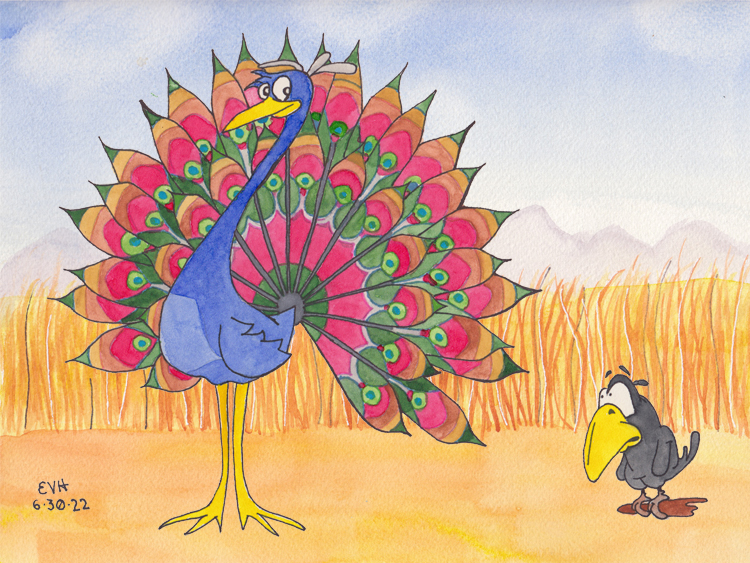
Jataka 339
Bāveru Jātaka
A Tale from Bāveru
as told by Eric Van Horn
originally translated by H.T. Francis and R.A. Neil, Cambridge University
originally edited by Professor Edward Byles Cowell, Cambridge University
When you read this story, it takes a while to put it all together. It is about how, before the Buddha arrived, the Jain (Jains being a spiritual sect in India) Nāthaputta was honored as a spiritual leader. But after the Buddha arrived, he lost most of his influence.
“Before the crested peacock.” The Master told this story when he was at Jetavana. It is about the imposters who lost their former gains and glory. For the imposters who—before the birth of Buddha—received gain and honor, lost them at his birth, becoming like fireflies at sunrise.
Their fate was discussed in the Dharma Hall. When the Master came he asked about the topic the monks were discussing in their gathering. On being told what it was, he said, “Monks, not now only, but formerly too, before the appearance of those endowed with virtue, those without virtue attained to the highest gain and glory. But when those who were endowed with virtue appeared, those who were devoid of it lost their gain and glory.” And with this he told them this story from the past.
Once upon a time when Brahmadatta was reigning in Benares, the Bodhisatta was reborn as a young peacock. And when he was fully grown, he lived in a forest. He was exceedingly beautiful. At that time some merchants came to the kingdom of Bāveru, bringing on board ship with them a foreign crow. At this time, it is said, there were no birds in Bāveru. The natives—who from time to time came and saw this bird perched on the top of the mast—said, “Mark the color of this bird’s skin. Look at its beaked mouth at the end of its throat and its eyes like jewels.” Thus singing the praises of this crow, they said to these merchants, “Sirs, give us this bird. We need it, and you can get another in your own country.”
“Then take it,” the merchants said, “at a price.”
“Give it us for a single coin,” they said.
“We will not sell it for that,” said the merchants.
Gradually increasing their offer the people said, “Give it to us for 100 coins.”
“It is very useful,” they replied, “to us, but let there be friendship between us and you.” And they sold it for 100 coins.
The natives took it and put it in a golden cage and fed it with various kinds of fish and meat and wild fruits. In a place where no other birds existed, this crow, who was nonetheless endowed with evil qualities, attained the highest gain and glory. The next time these merchants came to the kingdom of Bāveru, they brought a royal peacock which they had trained to scream at the snapping of the fingers and to dance at the clapping of the hands. When a crowd had gathered together, the bird stood in the front of the vessel, and flapping its wings, it uttered a sweet sound and danced.
The people that saw it were highly delighted and said, “This king of birds is very beautiful and well-trained. Give it to us.”
The merchants said, “We first brought a crow. You took that. Now we have brought this royal peacock and you beg for this, too. It will be impossible to come and discuss any bird in your country.”
“Be content, sirs,” they said. “Give this bird to us and get another in your own land.”
And raising the price, they at last bought it for 1,000 coins. Then they put it in a cage ornamented with the seven jewels and fed it on fish, flesh and wild fruits, as well as with honey, fried corn, sugar-water and the like. Thus did the royal peacock receive the highest gain and glory. From the day of his coming, the gain and honor paid to the crow disappeared. No one wanted even to look at it. The crow no longer got food either hard or soft. So with a cry of “Caw, caw,” he went and settled on a dunghill.

Figure: The better of two birds
The Master, making the connection between the two stories, in his Perfect Wisdom repeated these stanzas:
Before the crested peacock had appeared,
Crows were with gifts of fruit and meat revered,
The sweet-voiced peacock to Bāveru came,
The crow at once was stripped of gifts and fame.
So man to diverse priests due honor paid,
Till Buddha the full light of truth displayed,
But when the sweet-voiced Buddha preached the law,
From the outcasts their gifts and praise all men withdraw.
After uttering these four stanzas, he thus identified the birth: “At that time the Jain Nāthaputta was the crow, and I was the royal peacock.”
